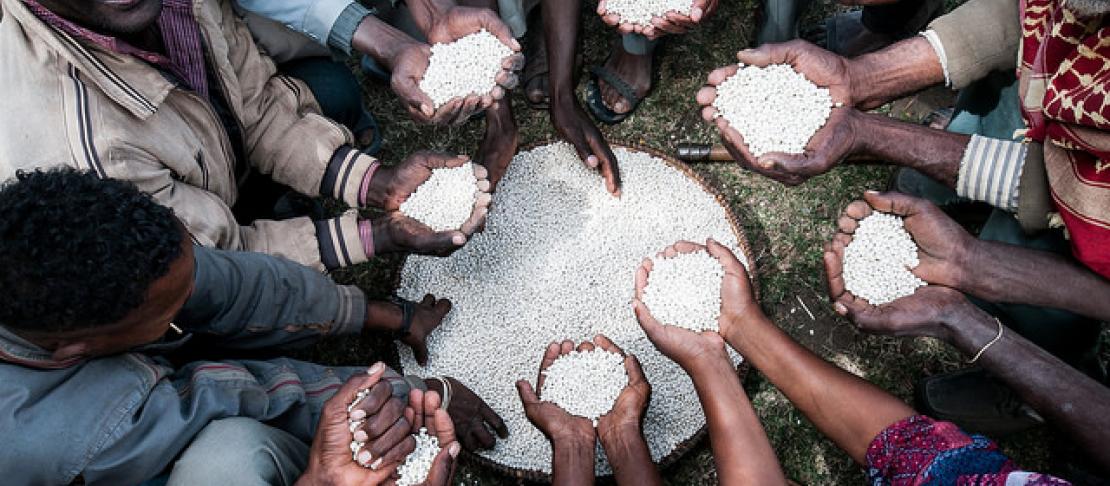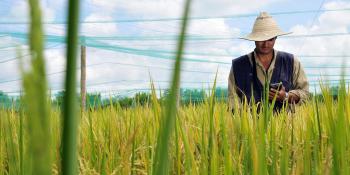Innovative climate change partnerships bring hope for smallholder farmers in Africa

Report back from Farmers Day at the UN Climate Change Conference.
If the music changes, you must change the dance steps. So goes a popular proverb from West Africa. This has been the realization of Kisilu Musya, a small scale farmer from the Eastern part of Kenya, a semi-arid region experiencing some of the worst impacts of climate change.
Kisilu remembers well his farming system 15 years ago.“The rains were plenty. I grew local maize varieties every season and received a bumper harvest each time,” he told the audience at a side event organized by the Africa Climate-Smart Agriculture Alliance on 2 December in Paris. However, with a changing climate, he noted that over a period of time local maize varieties no longer gave good yields. He was struggling to feed his family of nine children and wife Christina. Subsequently, he joined a farmer field school operating in his village where he amassed knowledge on new farming methods and accessed drought-tolerant seed varieties. Now a research farmer, Kisilu tries out new crop varieties, determining which ones yield best before sharing lessons with his community. His main concern, however, is the need for long term solutions: where crops, trees and cattle work together to form a sustainable and long term circle of produce.
Watch the official trailer of the movie Kisilu: Before the flood
Kisilu’s experience sets the scene for climate scientists, policy makers and development practitioners to explore innovative partnership approaches to achieve climate-smart agriculture (CSA) in Africa. The event, which was moderated by Lindiwe Sibanda from the Food, Agriculture and Natural Resources Policy Analysis Network (FANRPAN), showcased multi sector collaborations in action highlighting progress to date and upcoming developments.
Live from #COP21 on scaling up climate smart agriculture in Africa @africacsa pic.twitter.com/WvCgsGcc4T
— CCAFS cgiarclimate (@cgiarclimate) December 2, 2015
Multi sector collaboration: The Africa CSA Alliance
Set up to leverage policy, technical and financing support for grassroots, national and regional-level programmes and initiatives, "the Africa CSA Alliance aims to drive widespread adoption of CSA practices by local farmers like Kisilu throughout sub-Saharan Africa," explained Chris Armitage from World Vision, one of the Alliance members. The aim is to reach at least six million farming households in Sub-Saharan Africa by 2021 thereby contributing to the African Union’s broader goal of supporting 25 million farming households by 2025.
Chikakula Miti from the Common Market for Eastern and Southern Africa (COMESA) highlighted the role of regional economic commissions (RECs), in promoting uptake of CSA in member countries. Starting 2014, COMESA, the East African Community (EAC) and the Southern African Confederation of Agricultural Unions (SACAU) have supported five countries to prepare country-specific climate-smart agriculture framework programs (CSA-FPs). The countries are Kenya, Uganda, Tanzania, Botswana and Namibia.
Read more: Enhancing readiness to address climate shocks in Africa.
Linking CSA science with policy: tools and practices
The Alliance also has CGIAR providing technical support by availing science-based approaches to aid CSA decision making.
"CSA is not just about technologies which CGIAR and its partners are trialing but about extension. It entails creation of an enabling environment through appropriate policy formulation as well as provision of timely climate services to the farmer. This should translate to multiple benefits including improved productivity and resilience", said Todd Rosenstock from the World Agroforestry Center (ICRAF) during the meeting.
With the knowledge that CSA is context specific and subject to priorities of farmers, Rosenstock and colleagues from the CGIAR Research Program on Climate Change, Agriculture and Food Security (CCAFS) are availing science-based information, approaches, and tools to governments and other stakeholders to guide CSA programming including policy implementation. The engagement is demand-driven, ensuring that science is responding to policymakers’ needs.
Rosenstock: we need productive, resilient, low-emission food systems. There are many agricultural interventions to get there! @ICRAF #COP21
— CCAFS cgiarclimate (@cgiarclimate) December 2, 2015
CSA and agricultural development
Although having good policy frameworks at the national level is crucial in promoting agriculture, this was not enough to support the smallholder farmer.
"If you want to impact farmers such as Kisilu, it must be on his farm," said Yemi Akinbamijo, Executive Director of the Forum for Agricultural Research in Africa (FARA) during the side event. As one of the technical members of the Africa CSA Alliance, FARA facilitates the dissemination and adoption of agricultural technologies and best practices as they emerged from the research system. FARA's current strategy includes the use of innovation platforms (IP) where a number of actors interact to jointly identify problems and investigate solutions leading to generation of innovations and accompanying socio-economic benefits with a number of institutions in Africa. An innovation platform is a forum comprising relevant actors selected along the value chain of a specific commodity or system of production. The actors include farmers such as Kisilu, researchers, extension agents, traders, processors, financial institutions, policy makers, regulators, output market operators, consumers and others.
More that 300 of these innovation platforms are operating in several African countries reaching smallholder farmers equipping them with skills and knowledge to transform their agricultural enterprises.
Is their hope for farmers?
Despite the slow process of getting agriculture into a new climate agreement, stakeholders should remember that deal or no deal, a lot can be achieved through multi-stakeholder collaboration. To the smallholder farmer, all is not lost as many countries continue to show commitment to harness the potential of agriculture in achieving a low carbon pathway.
"I have a lot to tell my community. Most important, they have not been forgotten as you are all here looking after their interest," said Kisilu in his parting remarks to the discussions.
His Royal Highness Prince Seeiso Bereng Seeiso of Lesotho closed the session with a passionate speech about the critical role that African farmers play in ensuring a food-secure future. He urged COP21 to take African farmers as serious partners.
HRH Prince Seeiso Bereng Seeiso of Lesotho urges #COP21 to take African farmers as serious partners @africacsa pic.twitter.com/80BOEm5FxI
— CCAFS cgiarclimate (@cgiarclimate) December 2, 2015
The event was jointly organized by the International Livestock Research Institute (ILRI); the Food, Agriculture and Natural Resources Policy Analysis Network (FANRPAN); the Forum for Agricultural Research in Africa (FARA); the Norwegian Forum for Environment and Development (ForUM); the Southern African Confederation of Agricultural Unions (SACAU); the University of Copenhagen; and the World Vision International (WVI).
View photos of the meeting on Flickr.
Blog written by Vivian Atakos, Communications Specialist at CCAFS East Africa. Contributions were received from Vanessa Meadu, CCAFS Global Communications and Knowledge Manager. and Catherine Mungai, Policy and Partnerships Specialist at CCAFS East Africa.



